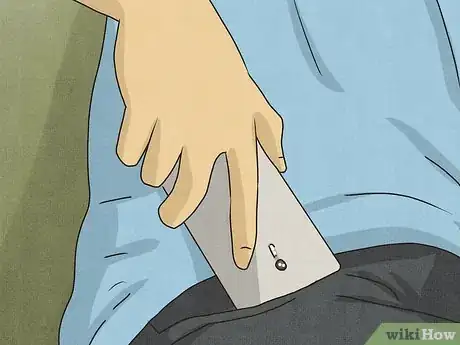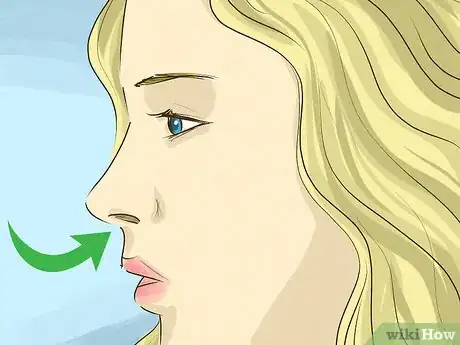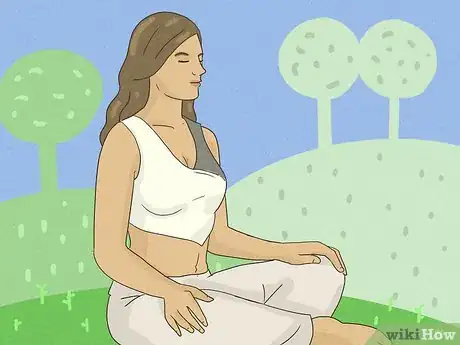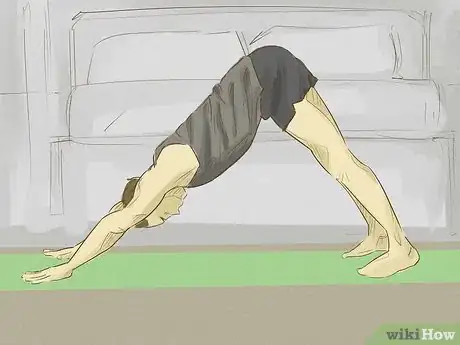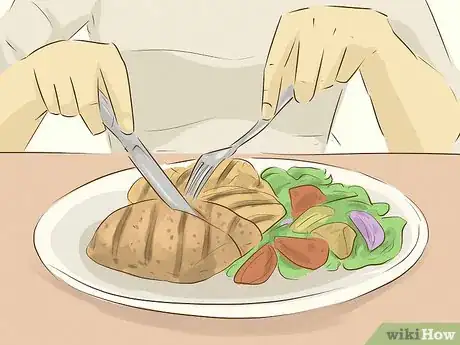This article was co-authored by Mirjam Quinn, PhD and by wikiHow staff writer, Aly Rusciano. Dr. Mirjam Quinn is a Licensed Clinical Psychologist and the Founder of Mirjam Quinn and Associates based in Illinois. With over 13 years of experience, she specializes in using cognitive-behavioral, mindfulness-based, and attachment theory grounded therapy techniques to provide psychological care for the whole person. Dr. Quinn also has a special focus on working with people from diverse and multicultural backgrounds and adoptive and blended families. She earned her PhD in Psychology from Purdue University and completed her internship at Butler University. Dr. Quinn is a member of the American Psychological Association (APA) and the APA Division for Peace Psychology and the Society for Child and Family Policy and Practice.
There are 17 references cited in this article, which can be found at the bottom of the page.
This article has been viewed 7,847 times.
Sometimes the world just gets too much and you find yourself caught up in negative energy. Mental health is more important than ever these days, and you don’t need an excuse to give yourself a little extra love. So, take a deep breath because we’re here for you—you can and will get through this. Here are some tips on how you can detox your mind from negativity.
Steps
Take a nature walk.
-
A breath of fresh air can help you clear your mind. When things get tough, take a deep breath and go somewhere else. There’s something naturally calming about being outside, so take advantage of Mother Nature’s beauty on days when you need it most.[1] X Expert Source

Licensed Clinical Psychologist Expert Interview. 3 March 2022.- Go to a local park, walk a local nature trail, or take a simple stroll around the block.[2] X Research source
- If you can’t go for a walk, no problem! Just going outside will give you a mental boost.
- Sit on your front porch, find a shady park bench, or chill out on your back steps.
Turn off the news.
-
Sometimes the hustle and bustle of current events can be too much. Avoiding the news can help you remember the happier things in life, especially when you’re anxious. Try reading a book or listening to music in the morning instead of turning on the news or reading the paper.[3] X Trustworthy Source Cleveland Clinic Educational website from one of the world's leading hospitals Go to source
- Resist the urge to Google current events.
- Unfollow news stations on social media to avoid triggering headlines and news reports.
- Turn off news notifications on your phone.
- If avoiding the news completely isn’t possible, no worries! Set a timer for yourself when watching or reading the news and stop watching or reading when the timer goes off.
- Use weather and traffic apps to help you get through the day without current events.
Log off social media.
-
A digital detox could be just what you need. Sometimes all you need to be happy is to live in the current moment.[4] X Trustworthy Source Mayo Clinic Educational website from one of the world's leading hospitals Go to source Instead of endlessly scrolling through Instagram or Twitter, log off and appreciate what’s around you.
- Start by logging out of all social media accounts or deleting the apps from your phone.
- Keep your phone in another room to avoid the temptation to pick it up.
- Set a timer for 30 minutes to check your accounts. When the timer goes off, your time is up.
Listen to something that makes you happy.
-
Turn on your favorite playlist to brighten your mood. Who’s your favorite artist? Do you have a podcast you love listening to? When those negative thoughts start to take over, put those earbuds in and drown them out. Put on a song that makes you dance, or an audio book that will let you escape reality if only for a moment.[5] X Research source
- If you’re a visual person, hit play on your favorite movie or TV show.[6] X Trustworthy Source Mind U.K.-based mental health charity focused on providing advice and resources to anyone facing mental health problems. Go to source
Start an art project.
-
Why cry when you can craft? Let those tears and negative thoughts become something beautiful. Whether you’re painting, sculpting, or sketching, art is a great way to let out your frustrations and forget about your worries—plus you get a work of art to showcase! Spend an afternoon creating something new.[7] X Research source
- Find an art of craft that you’re interested in and work from there.
- Do you like hats? Try knitting a beanie.
- Do you love wearing jewelry? Try your hand at beading.
- Do you admire the colors of the sunset? Try painting it.
Surround yourself with positivity.
-
Your energy feeds off the energy around you. Think of who you’re with everyday. Do the people around you lift you up or push you down? Surround yourself with positive people who help you be the best version of yourself.[8] X Research source
- Schedule weekly catch ups with friends and family that help you feel good. This will also give you something to look forward to each week.</ref>https://headspace.org.au/young-people/learn-how-to-handle-tough-times-to-help-your-headspace/</ref>
Start a journal.
-
Clear your head and put it all on paper.[9] X Expert Source

Licensed Clinical Psychologist Expert Interview. 3 March 2022. It can be hard sorting through a swarm of negative thoughts, and that can make it even harder to reflect on why you’re feeling the way you are. Grab a piece of paper, open a journal, or tap the notes app on your phone and write down whatever comes to mind.[10] X Research source Try these starting phrases if you get stuck:[11] X Research source- “I am…”
- “I am not…”
- “I fear…”
- “I hope…”
- “I love…”
Treat yourself.
-
You are amazing, and it’s time you tell yourself that. Buy yourself that dress you’ve been wanting, take yourself out to dinner, or splurge on a spa day. There’s no harm in pampering yourself every now and then! Give yourself a boost by treating yourself to something you want.[12] X Research source
- You don’t need to spend money in order to treat yourself. Do whatever makes you feel happy.
- Marathon your favorite movies with a giant bag of popcorn.
- Take a bubble bath in the middle of the day.
- Dance around to your favorite songs while baking your favorite cake.
Stop and smell the roses.
-
Appreciate the little things in life. You only get one shot at this whole life thing, so why not fill it with all the joyful moments? Focus on the little things when you have negative thoughts—live in the current moment.[13] X Trustworthy Source Mayo Clinic Educational website from one of the world's leading hospitals Go to source
- Feel the sun warming your cheeks.
- Smell the air right after it rains.
- Try to worry less about the past and future and focus on what’s happening right now outside your head.
Try breathing exercises.
-
One breath can be the difference between panic and calm. When life gets overwhelming, remember to take a step back and breathe. Counting your breaths can help you relax and focus on something other than those negative thoughts. Try these exercises the next time you’re stressed:[14] X Research source
- Belly breathing: lie down on your back with one hand on your belly and the other hand on your chest. Take a deep breath in through your nose, feeling your belly expand, and breathe out through your mouth, feeling your belly deflate. Repeat this 3 to 10 times.
- 4-7-8 breathing: take a deep breath in through your nose while counting to 4, hold your breath for 7 counts, and then slowly release the air through your mouth for a count of 8. Repeat 3 to 7 times.
Meditate to calm your mind.
-
Ease your worries by thinking of nothing at all. Let your mind rest by meditating, allowing thoughts to come and go as they please.[15] X Expert Source

Licensed Clinical Psychologist Expert Interview. 3 March 2022. The beauty of meditation is the art of just letting things happen. Close your eyes and watch those negative thoughts drift away.[16] X Research source- Be mindful of your breath, especially when your mind starts to wander.
- Sit in a comfortable position and set a timer for 5 to 10 minutes.
- Judgment is not allowed into your meditation party! Every thought that comes to mind is valid.
Stay active.
-
Get up and move those negative thoughts away. Exercise is a great way to distract you from negativity and get your endorphins—the happy hormone—pumping! Add some more movement into your routine by doing something you love.[17] X Expert Source

Licensed Clinical Psychologist Expert Interview. 3 March 2022. Taking an extra walk or trying a dance video could be the difference between a good and bad day.[18] X Research source- Look into live fitness classes in your area. Attending in-person yoga, dance, or workout classes will give you a chance to make friends and give you something to look forward to.
- What you look like exercising doesn’t matter. Do what makes you feel good inside and out!
Eat a balanced diet.
-
A well-nourished body is a happy body. It may sound silly, but giving your body the nutrients it needs can help you strive physically and mentally. Now, this doesn’t mean knocking junk food completely off the table. Just find ways to incorporate more fruits and veggies into your diet. If you’re feeling sluggish, reach for a fruit smoothie rather than a chocolate milkshake.[19] X Research source
- Try to make half of your plate fruits and veggies.[20] X Research source
- Eat the rainbow by adding more color to your plate with purple potatoes, yellow carrots, and plenty of greens.
- Hydration is key! Make sure you’re getting at least 8 cups of water a day.[21] X Trustworthy Source Mayo Clinic Educational website from one of the world's leading hospitals Go to source
Get enough sleep.
-
A well-rested body can help you stay positive. By getting between 7 and 10 hours of sleep a night, you’ll wake up energized and ready to take on the day! For every hour of sleep you lose, there is a 38% increased chance that you’ll feel sad throughout the day. Getting a good night’s sleep can help you finish the day strong with a smile.[22] X Research source
- Try to go to bed and wake up at the same time each day—even on the weekends.
- Keep your bedroom dark, quiet, and cool at around 60 to 64 °F (16 to 18 °C).
- Turn off your screens at least 30 minutes before bed.
Be kind to yourself.
-
You are one incredible human being. We can be our worst critics, but it’s important to remember that we all make mistakes. Practice being kind to yourself to improve your self-esteem and kick out those negative thoughts.[23] X Research source
- Instead of beating yourself up if something goes wrong or you get a bad grade on a test, remember that you’re doing your best.[24] X Research source
- You learn something new each day, so take those mistakes and know that you’ve gained something valuable with them.
- Think about all the things you can do and tell yourself how proud you are of you.
Ask for help.
-
You’re not alone in this fight. Reach out for help if you’re struggling with intrusive negative thoughts. You can ask a close friend or family member if they have time to talk, or find a local therapist or counselor near you. Your future is bright no matter what those negative thoughts say.[25] X Research source
You Might Also Like
 How to Shift Reality
How to Shift Reality
 13 Telltale Signs Someone Doesn't Respect You
13 Telltale Signs Someone Doesn't Respect You
 How to Contact Yourself in a Parallel Universe
How to Contact Yourself in a Parallel Universe
 How to Tell If Your Girlfriend Is Toxic
How to Tell If Your Girlfriend Is Toxic
 How to Get Rid of a Narcissist
How to Get Rid of a Narcissist


 How to Use the Raven Method (Reality Shifting)
How to Use the Raven Method (Reality Shifting)
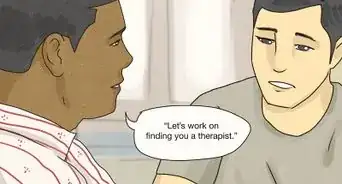




 How to Escape the Simulation: What Is the Simulation Hypothesis and More
How to Escape the Simulation: What Is the Simulation Hypothesis and More
References
- ↑ Mirjam Quinn, PhD. Licensed Clinical Psychologist. Expert Interview. 3 March 2022.
- ↑ https://brevardhealth.org/why-going-outside-is-good-for-you/
- ↑ https://health.clevelandclinic.org/digital-detox/
- ↑ https://www.mayoclinic.org/healthy-lifestyle/stress-management/in-depth/how-to-be-happy/art-20045714
- ↑ https://headspace.org.au/young-people/learn-how-to-handle-tough-times-to-help-your-headspace/
- ↑ https://www.mind.org.uk/information-support/your-stories/tackling-negative-thoughts-with-distraction/
- ↑ https://headspace.org.au/young-people/learn-how-to-handle-tough-times-to-help-your-headspace/
- ↑ https://www.thevoicesofhope.org/written-stories/2019/12/10/the-power-of-surrounding-yourself-with-positive-people
- ↑ Mirjam Quinn, PhD. Licensed Clinical Psychologist. Expert Interview. 3 March 2022.
- ↑ https://headspace.org.au/young-people/learn-how-to-handle-tough-times-to-help-your-headspace/
- ↑ https://www.mindful.org/7-mindful-writing-prompts-to-foster-a-deeper-connection-with-yourself/
- ↑ https://www.uofmhealth.org/health-library/abl0335
- ↑ https://www.mayoclinic.org/healthy-lifestyle/stress-management/in-depth/how-to-be-happy/art-20045714
- ↑ https://www.uofmhealth.org/health-library/uz2255
- ↑ Mirjam Quinn, PhD. Licensed Clinical Psychologist. Expert Interview. 3 March 2022.
- ↑ https://www.mindful.org/how-to-meditate/
- ↑ Mirjam Quinn, PhD. Licensed Clinical Psychologist. Expert Interview. 3 March 2022.
- ↑ https://headspace.org.au/young-people/tips-for-a-healthy-headspace/
- ↑ https://headspace.org.au/young-people/tips-for-a-healthy-headspace/
- ↑ https://www.myplate.gov/eat-healthy/what-is-myplate
- ↑ https://www.mayoclinic.org/healthy-lifestyle/nutrition-and-healthy-eating/in-depth/water/art-20044256
- ↑ https://headspace.org.au/assets/Factsheets/HSP225-Sleep-Fact-Sheet-DP3.pdf
- ↑ https://headspace.org.au/young-people/learn-how-to-handle-tough-times-to-help-your-headspace/
- ↑ https://www.annafreud.org/on-my-mind/self-care/be-kind-to-yourself/
- ↑ https://headspace.org.au/young-people/what-is-mental-health/
About This Article



